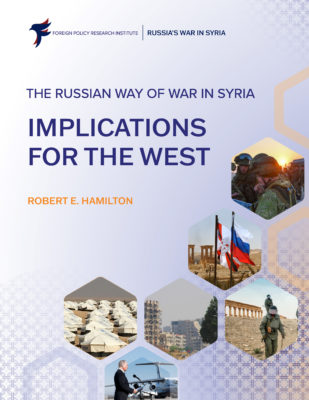A nation must think before it acts.
This report is a part of FPRI’s edited volume Russia’s War in Syria: Assessing Russian Military Capabilities and Lessons Learned.
The Russian Federation’s intervention in Syria is a watershed event. However the war there ends, its impact on Russia is likely to be profound. For the first time in its post-Soviet history, Russia’s military is fighting outside the borders of the former Soviet Union. In doing so, it is exercising military capabilities that had atrophied from long lack of use. Moscow is also rebuilding its diplomatic muscle through its role in Syria by managing a diverse coalition, leading a parallel peace process, and forcing the United States to take the Kremlin’s preferences into account when making decisions in the Middle East. Through Syria, Russia has reemerged on the geopolitical stage. The war is not over, and there are many ways in which things could still go badly for Russia. Moscow may find that a return to geopolitical prominence entails costs and risks at least as great as the rewards that status brings. Nevertheless, the West will be dealing with a Russia that has changed fundamentally through its experience in the war.
Understanding these changes and their implications for Western governments is the focus of this conclusion chapter. It is structured around two questions. First, what does Syria tell us about how Russia fights its wars? Second, how has Russia’s experience in Syria affected the capabilities of its armed forces? Answering these questions should increase our understanding of Russia as a geopolitical actor and allow Western governments to make more effective policy on issues where Russia is a factor.
Continue reading the chapter here.
Related Events






